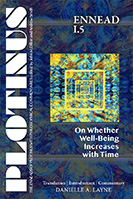

|
PLOTINUS Ennead I.5
On Whether Well-Being Increases with Time
Translation, with an Introduction, and Commentary
THE ENNEADS OF PLOTINUS
-WITH PHILOSOPHICAL COMMENTARIES
Series Edited by John M. Dillon and Andrew Smith
February 2024
978-1-7335357-4-8
152 pages - 6 x 9 - Paperback
$37.00 |
|
 Danielle A. Layne Danielle A. Layne
is Professor of Philosophy at Gonzaga University. She has published widely on Plato and the Platonic tradition, most notably the edited volume, with Harold Tarrant, The Neoplatonic Socrates (Penn State 2014) and the essay relevant for this book, “The Present Moment in Neoplatonic Philosophy” (Epoché: A Journal for the History of Philosophy 23, no. 2 [Spring 2019]: 445–460).
|
|
|
|
In Ennead I.5 Plotinus attempts to navigate a well-trodden path of inquiry by directly responding to a wide spectrum of popular theories on human flourishing, and insisting emphatically that well-being belongs to the present moment. Indeed, Aristotle—with his insistence that well-being be measured by “a complete life” (Nicomachean Ethics 1098a16–20) or a life measured by virtue, a modus vivendi sustained via the development of appropriate habits (hexis) and the avoidance of misfortunes—is one of Plotinus’ central targets.
Nevertheless, it is also obvious that the Hellenistic schools, with their almost evangelical insistence that happiness is available to practitioners in the immediacy of the “now,” take pride of place in Plotinus’ short treatise on the subject. Layne analyzes in depth Plotinus’ unique conception of the value of the present moment by highlighting his dialogue with Aristotle and Hellenistic conceptions of the soul, pleasure and pain, time and eternity, and so forth.
Plotinus was a Platonist, committed to expounding the doctrines put forward by Plato some seven centuries earlier. He was born and educated in Egypt, where he studied the teachings of Plato under the guidance of Ammonius Saccas. He came to Rome in 244 CE and built up a circle of followers devoted to studying Plato through Plato's own works and those of philosophers, both Platonist and non-Platonist, of the intervening centuries. From his fiftieth year Plotinus himself wrote down, in Greek, the findings of the seminars, and these writings were later edited by one of his pupils, Porphyry, and published in six groups of nine treatises entitled the Enneads (from the Greek word for nine – ennea). |
|
"This is an exceptionally rich study of Plotinus's arguments distinguishing the life well-lived (in time) and genuine well-being (which is eternally present), drawing on the whole body of the Enneads as well as this one short treatise. Danielle Layne elaborates and explains the conversation between Plotinus and his predecessors, especially Aristotle. Scholars and philosophers concerned with Aristotle's ethics and metaphysics will find much to debate here, and those inclined to follow Plotinus' lead will profit from her guidance.” |
—Stephen R. L. Clark
Emeritus Professor of Philosophy
University of Liverpool |
|
"With a succinct introduction, detailed commentary, and clear translation, Layne unravels and explains Plotinus' condensed ideas on well-being and time and puts them into the context of Platonic, Aristotelian, Stoic and Epicurean discussions. A welcome contribution to Neoplatonic studies." |
—Wiebke-Marie Stock
University of Bonn, Germany and
Guest Assistant Research Professor
at the Medieval Institute, University of Notre Dame |
|
|
|
|
|

